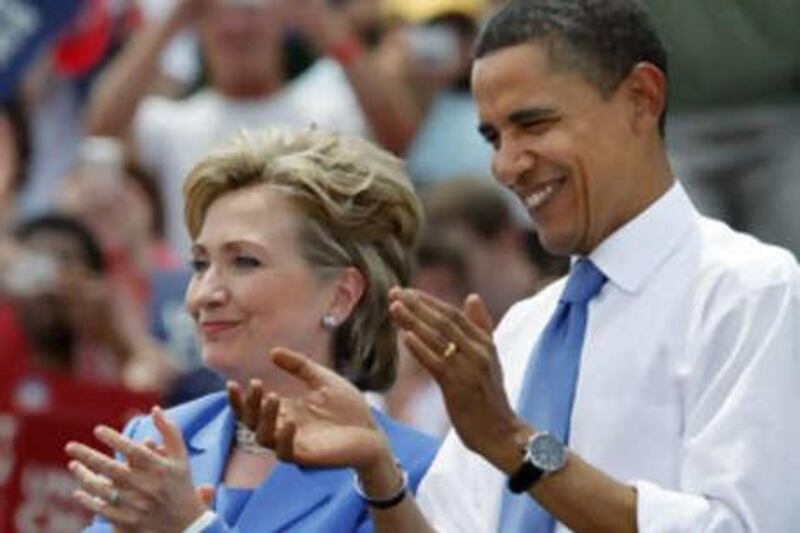WASHINGTON // Three red phones, the kind that conjure images of a cold war nuclear catastrophe, sat on tables near Capitol Hill last month outfitted with signs saying, "Direct Line to Iran". And, in fact, waiting on the other end, 10,000km away, were several ordinary Iranians ready to do something the United States and the Islamic republic have not done for a long time - talk. The event, which attracted both congressional legislators and curious bystanders, was something of a political stunt in a city that is full of them. But it was likewise part of a burgeoning anti-war movement led by those opposing a military strike against Iran and pushing diplomacy.
"The idea is just to bring normal people together," said Carah Ong, of the Center for Arms Control and Nonproliferation, the organiser of the red phone event, which also has been staged in New York City and Boston. "It's an act of civilian diplomacy more than anything else." Much has been made of the escalating rhetoric regarding Iran and its nuclear programme emanating from the White House and, more recently, John Bolton, the former US ambassador to the UN. Mr Bolton sent shock waves through the Middle East last week by declaring Israel is likely to attack Iran before January, prompting a war of words.
Tough talk on Iran has also been a hallmark of the US presidential campaign. John McCain, the presumptive Republican nominee, famously set the words "Bomb Iran" to the Beach Boys song, Barbara Ann. Despite suggesting a willingness to engage diplomatically, Barack Obama, Mr McCain's likely Democratic rival, recently blurted out "threat" as the first word that came to mind when an interviewer mentioned Iran in a word-association game. Hillary Clinton, before she dropped out of the presidential race, said she would "obliterate" Iran if that country attacked Israel.
But across the country, grassroots activists are growing a movement - one that has brought together an unusual coalition of those on the Left and the Right - opposing a military attack of any sort. Some groups are lobbying federal legislators to reject a non-binding congressional resolution that calls on the president to stop shipments of refined petroleum to Iran - which critics say effectively amounts to a naval blockade that might be considered an act of war.
In Chicago, the No War on Iran Coalition is pushing a city council resolution against an attack - the city already passed two measures against the Iraq war, including one demanding the withdrawal of troops. The international affairs committee of the US Conference of Mayors adopted a similar resolution last month. And, this year, the Washington-based group Just Foreign Policy sponsored a 23-city Folly of Attacking Iran tour, with speakers that included Trita Parsi, president of the National Iranian American Council.
"Do we want another Iraq? Do we want to do this all over again?" said Vicente Garcia, of Americans for Informed Democracy, who helped put on Folly events in Seattle, Miami, Baltimore and Washington. "I think the consequences would be so dire that we have to mobilise," added Mike Lynn, a self-described peace activist and co-founder of Chicago's No War on Iran group. "We have to treat it as a real threat even if this is just sabre-rattling to try to get sanctions."
According to a May survey by the polling firm Gallup, nearly 60 per cent of US residents support a direct meeting between the US and Iranian presidents (71 per cent of Democrats think such a meeting is a good idea, while just over half of Republicans think it is a bad one). Schauleh Vivian Sahba, a second-generation Iranian American from California, did her part for peace in the form of a public service announcement posted on YouTube that got 27,000 hits in one month. Using a borrowed camcorder, she recorded a video presenting dozens of Iranian Americans, young and old, conservative and liberal, Muslim and Jewish, in what she called 50 Voices of Peace.
Last month's red phone event on Capitol Hill, called The US and Iran: It's Time to Talk!, consisted of about 50 telephone conversations between Americans and Iranians. Among them: a 60-year-old petroleum engineer, a high school student, a pilot and a literature professor. Several legislators, representing both political parties, warned against the dangers of an attack and urged diplomacy. Phil Giraldi, a former counterterrorism expert at the Central Intelligence Agency who attended the event, said: "I have no real illusions about Iran and the Iranian government. I worked in the 1980s against Iranian terrorism in western Europe and in the Middle East. The government of Iran is not necessarily a benign institution in my point of view. But given that, I believe that there are very serious consequences to any kind of military action against Iran."
Ms Ong reiterated her concerns last week. "It's just so unfathomable this is even being considered, it would just usher in disastrous consequences both for the people of Iran but also American security interests in the region," she said. "We have really undermined our moral authority with our actions in the region in the last few years. I can't even imagine what would happen if we were to actually attack Iran."
@Email:eniedowski@thenational.ae






